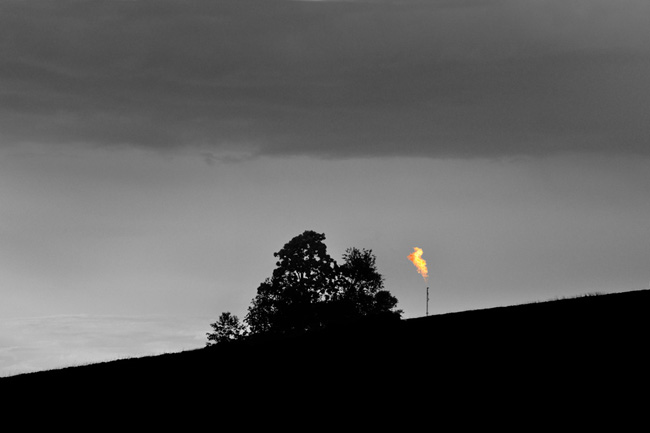Editor’s note: HEFN is pleased to share the following post written by Grant Oliphant, president of The Heinz Endowments. This post was first published on The Heinz Endowments blog on 9/12/2014 and is reprinted here with permission.
A just-published Yale University study finding that people who live near natural gas wells suffer from higher rates of respiratory and skin ailments than people who live farther away has come under fire from pro-drilling industry associations.
The Yale-led study, conducted in southwestern Pennsylvania with funding from The Heinz Endowments, was clear in its scope and limitations. It sought to determine whether living in close proximity to a gas well correlates with health effects of any kind.
Participants — nearly 500 residents of Washington County with ground-fed water wells — were not asked about fracking or living near drilling operations, and the results were controlled for possible distortions from other potential factors. The researchers, in fact, found that living in closer proximity to gas wells correlates with a higher risk of upper respiratory symptoms and skin conditions.
The study does not prove — nor was it intended to — that drilling operations are causing that association, or if so, what the underlying mechanism might be. This type of study is designed simply to establish whether there is something going on with human health that requires further investigation.
And that’s precisely what the Yale research does. As Meredith Stowe, the study’s senior author, commented in The Plain Dealer (Ohio): “It’s possible that there is some effect from fracking that should be looked into more to see if it really is there. If it’s causing health effects, then we should find out about it.”
That seems like a perfectly reasonable position. But there is a well-honed, four-step paradigm, invented by Big Tobacco decades ago, for how industries sometimes deal with public health research they find inconvenient:
(1) dismiss the science,
(2) attack the researchers,
(3) attack the study’s funders, and
(4) embrace “better” studies that of course will never happen.
As reported by The Plain Dealer, that was exactly the playbook followed by the Ohio Oil and Gas Association, which denounced the study, through its public relations director, as “junk science.”
Step 1, check!
“You throw Yale’s name on it, and everyone is supposed to take this seriously,” the PR director added.
Step 2, check!
Then he attacked the Endowments, for having given money “to every anti-oil and gas development group in Pennsylvania.”
Step 3, check!
Asked about whether further research might be necessary, he offered, “Science is good. We’re all for taking a hard, serious look.”
Step 4, check!
Science is good? You bet it is.
Real science asks tough questions, and it goes where the evidence leads, even if the results are challenging for some people to accept.
As natural gas drilling intensifies in our region, the role of philanthropy should be to ask the important questions about how that drilling is affecting human health, the environment and the quality of life in our communities — and to help find the answers and solutions we all need and all should want.
That’s what the Yale study did. We are proud to have sponsored this research, and we will proudly continue to support work that builds public understanding of fracking’s impacts and the search for solutions that understanding should bring about.

Grant Oliphant is president of The Heinz Endowments. He rejoined the foundation in June 2014, after serving as president and chief executive officer of The Pittsburgh Foundation for six years.

